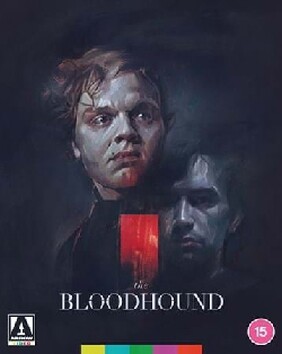The Bloodhound is the directorial debut from Patrick Picard, and is loosely based on Edgar Allan Poe’s short story, The Fall of The House of Usher (1839). The story follows a disenchanted young man who visits his elusive childhood friend at the request of a beckoning letter, and the uncomfortable terrors that follow.
Clocking in at only 72 minutes, this psychological slow-burn explores a few of the themes and ideas of its inspirational ancestor, using a few key plot points from the short story to present its ideas, though for the most part remains its own film completely. Inclusions such as the titular, and likely metaphorical, antagonist himself and the modernised setting of the Luret mansion enable a fresh horror to be invoked from the work while key themes retain what made the original so chilling.
These themes are as relevant now as they were almost two hundred years ago; social isolation, mental health (with obvious correlations between the two), and obligations felt through different relationships. Although ideas of friendship are explored in some emotional ways, a rather cold atmosphere permeates the picture, aided by uncannily stilted performances from its two leads. These, along with beautiful, yet clinically-focused camerawork give the impression of looking into another universe at times.

As mentioned, this is another slow one, but if you’ve read any of my previous articles you should almost expect that by now. Rather than rely on scenery or atmosphere The Bloodhound is primarily dialogue-driven, as expected from a classic story adaptation. And it’s expertly handled by the two leads Joe Adler and Liam Aikan, both in delivery and consistent conviction until the final scene. You feel every pinch of Francis’ (Aikan) discomfort at the whims of the eccentric and disturbed Jean Paul Luret (Adler) and the growing distrust by both of them as each narrative intricacy reveals itself.
The Bloodhound plays out much like an upper-class The Lighthouse (2019) in many ways, with a modernised dash of Alex Garland’s Ex-Machina (2014). With plenty enough detail within its short runtime to keep the most perceptive viewer engaged. It appears almost play-like with its limited cast, allowing plenty of opportunity for them to bounce off each other and get the most out of plot and setting. It revels in the confusion of the viewer, being that much of the information ascertained is unreliable, which bleeds through into our viewing experience as we start to doubt the things we are seeing are real. Those favouring familiar plots and more immediate scares may become frustrated.
Even Francis, our initially implied connection with sanity, begins to act oddly. Where most would have undoubtedly left the Luret household after many of JP’s increasingly hostile antics, Francis stays to enact his own motives, leaving us all the more alone in the Luret mansion. The chemistry between these two characters is so engrossing at times that any ‘horror scene’ that does fall upon us is made all the more jarring because of it. This elevates the film from effective psychological horror to a testament to the importance of strong acting and direction within the genre.
The Bloodhound is an intense, atmospheric and darkly comedic tribute to Edgar Allan Poe’s The Fall of the House of Usher, and a strong first entry for Patrick Picard. If his work continues to exude the same unsettling nihilistic macabre as this debut offering then I for one am in for the long haul.
Joe first knew he wanted to write in year six after plaguing his teacher’s dreams with a harrowing story of World War prisoners and an insidious ‘book of the dead’. Clearly infatuated with horror, and wearing his influences on his sleeve, he dabbled in some smaller pieces before starting work on his condensed sci-fi epic, System Reset in 2013.Once this was published he began work on many smaller horror stories and poems in bid to harness and connect with his own fears and passions and build on his craft.
Joe is obsessed with atmosphere and aesthetic, big concepts and even bigger senses of scale, feeding on cosmic horror of the deep sea and vastness of space and the emotions these can invoke. His main fixes within the dark arts include horror films, extreme metal music and the bleakest of poetry and science fiction literature.
He holds a deep respect for plot, creative flow and the context of art, and hopes to forge deeper connections between them around filmmakers dabbling in the dark and macabre.

